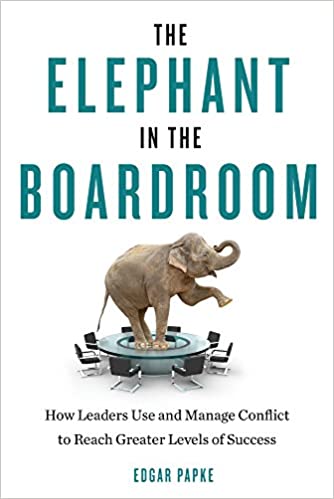For leaders, the path to true success runs through conflict. Yet, most leaders struggle with how to manage conflict effectively. In his book, The Elephant in the Boardroom, award-winning leadership psychologist and author Edgar Papke writes that, “When leaders fail to confront conflict, they become the ‘biggest elephant’ in the room.”
In our interview with Papke, he provides some insights into why the ability to confront and manage conflict is both the greatest challenge of leadership and the most important skill required for a leader to succeed.
Soundview: In The Elephant In The Boardroom, you point out that more than any other facet of leadership, conflict is the key to success. Why is that so?
Edgar Papke: If you step back and explore what we expect of great leaders, creating change and confronting conflict are at the forefront of how we define their success. While most leaders understand this, I find that most are unaware of the interdependency of these two elements and how important the role of conflict is. We don’t always see conflict as the natural force of human behavior that results in change. In light of this, leaders often fail to realize that conflict is the natural fuel that drives the engine of creativity and innovation. Including how it challenges them to personally grow and become more engaged and better as leaders.
SV: You cite a survey of more than 4,000 CEOs, executives, and managers, in which more than 90 percent admitted they were uncomfortable confronting conflict. What makes it so difficult for them to confront it?
EP: There are several reasons. Let’s start with the fact that everyone wants to be successful. For leaders, this is particularly true and the stakes are often higher and the fears and consequences associated with the potential of failure greater. These underlying fears include not being competent in effectively managing conflict and not being liked for taking a position. All too often, these fears result in a leader avoiding and not confronting a conflict and the perception that they are weak as leaders, lack integrity, or are not courageous enough. These fears are also the cause of the defensive behaviors that we associate with poor conflict management, including blame, the abuse of power, over-harmonizing, and other aspects of bad leadership that then result in the dysfunctions that organizations and teams suffer and keep them from reaching greater levels of success.
Unfortunately, despite the fact that constructively managing conflict is the key skill to a leader’s success, most don’t dedicate enough time to intentionally developing it. This means they are learning most of it through trial and error, without a framework or the self-knowledge they so desperately need to be successful. I think this is why surveys show that the reason most leaders seek coaching is to learn how to better manage the myriad of conflict they must deal with and why many decisions become so difficult for them to make.
SV: When it comes to learning how to improve their skills and manage conflict better, where should leaders start?
EP: It begins with acknowledging the role that conflict plays in the success of leaders and the need to dedicate time and effort to intentionally improve. This requires for leaders to explore who they are and to strive for the self-knowledge needed to better understand their own behavior, especially when confronting conflict. Only when a leader is able to understand their behavior, and the emotional origin of their behavior, can they become aware of their choices and more confidently, and constructively, confront and manage conflict.
Soundview subscribers get in-depth summaries of the key concepts in best-selling business books (like this one) delivered to them every month! Take your career to new heights by staying up-to-date with the trends and ideas affecting business leaders around the globe. Sign up for a free trial today.





